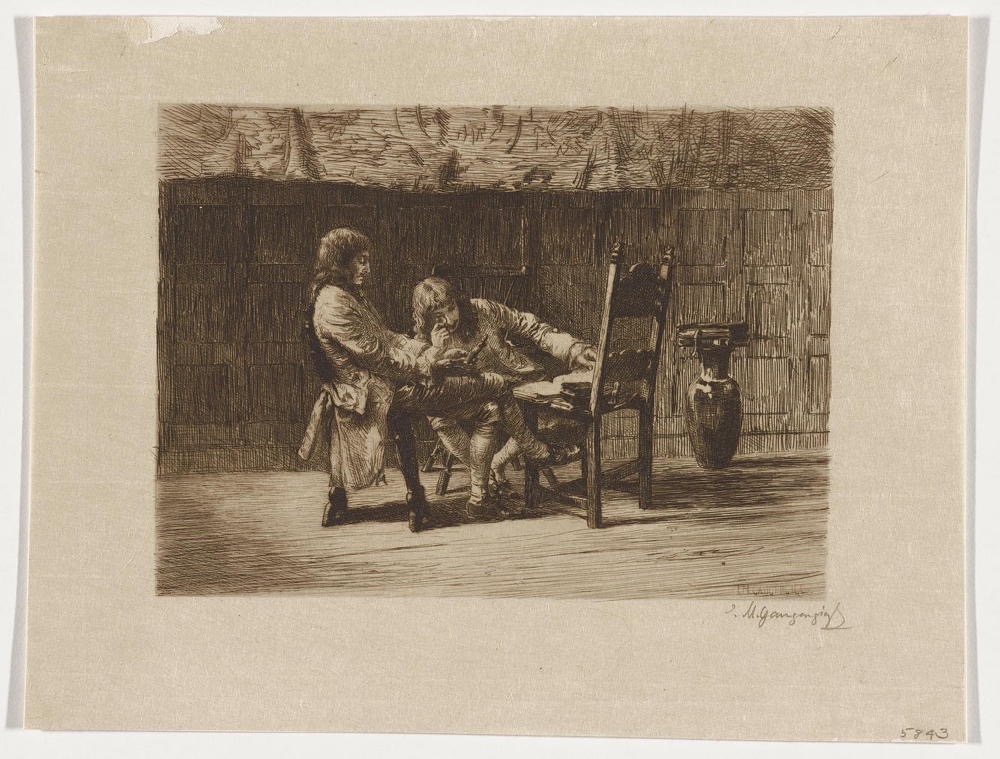Questioning

Ignaz M. Gaugengigl: A Difficult Question (19th century)
" …We abandon our cross-examinations when we grow weary of discovering…"
Authoritarians despise questions. They try to vilify questioners. They try and usually fail to insult questioners’ intelligence, as if asking were somehow threatening. They understand that there can never be any such thing as not answering a question, for even silence screams its response. Questioning can constitute a potentially healthy back-and-forth, a functional resonance. It’s almost impossible to maintain arrogance in its presence, for it tends to level every playing field. I suppose it’s little wonder why our authoritarians find it so upsetting. It renders it almost impossible to remain seated on any high horse through any barrage of Questioning.
Democracy seems at root a questionable practice, for it leaves many answers unresolved. It prescribes degrees of freedom as the ultimate treatment for most illnesses and defends most stridently the idea of equality. Nobody is above or below those laws; that’s the way a democracy is supposed to be. Neither money nor position is supposed to give permission to ignore the law. When questions come up, as they will, we’re all enjoined to at least try to answer them as if the questioner held Decent intentions and as if those questioned should feel gifted by the question. “Thank you for asking,” begins the proper response to most questions, never, “How dare you even imagine asking!”
Decency, like democracy, seems to demand an extended As If, where each citizen’s expected to sustain a belief in some useful, obvious fiction. It’s not so much that we were all created equal but that we’re better off when we behave As If we were. This encourages routine displays of mutual respect, without which we’d all be pretty much screwed. Nobody can successfully govern a country convinced that half the people are complete idiots or that only a select few qualify as geniuses or that only the rich can understand, or only the poor. Especially if half the people actually are complete idiots, does the concept of “as if” begin to make sense. I know that statement doesn’t make sense without slathering it with a generous swath of As If. The obvious tends to be the most useless; that’s why we rely so deeply upon each other’s Questioning. Questions provide premises for discovering what we might actually understand together. Those answers utterly depend upon a premising “as if”.
The true benefit of every doubt lies in the questions it elicits, even when those questions cannot reveal their answers. Acknowledging ignorance of even the barest presence of an answer holds the key to a wisdom that transcends knowing. The Why? Loops, my then five-year-old daughter used to subject me to, frustrated me because they challenged my presumption that I might know even half of the answers. They also highlighted the absurdity behind the belief that Questioning might settle something once and for all, for every question unavoidably opens more than it closes. It creates possibility more than it chokes it off. There can be no definitive response to even any finite question, for resolution insists that everyone involved move ever closer toward the infinite. Every Yes or No begets a why?, and every response to every Why? inspires a quest for even deeper understanding. We abandon our cross-examinations when we grow weary of discovering, not when we’ve asked every possible question or feel satisfied with that last answer.
©2025 by David A. Schmaltz - all rights reserved


